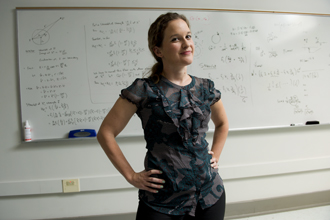A mathematical approach to solving ecological problems
Carrie Manore, a postdoctoral fellow in the in the Center for Computational Science and Department of Mathematics, at Tulane University, is making waves as a promising early career scientist.

Tulane mathematician Carrie Manore creates models to help scientists better understand and manage the spread of disease and the conservation of native species. (Photo by Paula Burch-Celentano)
Manore has received numerous accolades for her doctoral dissertation in mathematics and ecosystem informatics, which she submitted earlier this year at Oregon State University. She received the Council of Graduate Schools/Proquest 2012 Distinguished Dissertation Award in Mathematics, Physical Science and Engineering at Oregon (and has advanced to the national level of competition). She also won the Lee Segel Prize that recognizes the best student paper published in the Bulletin of Mathematical Biology in the previous two years.
“My dissertation focused on modeling the spread of infectious diseases that can affect multiple species,” says Manore.
She used case studies of an invasive European grass on the West coast and rinderpest, a multi-species livestock and wildlife disease that is a potential bio-terrorism threat.
Last year, Manore received a Newcomb College Institute faculty research grant to travel to South Africa in order to understand the spread of Rift Valley fever virus in wildlife.
“For two weeks I assisted with buffalo capture (sedation and sample collection) in wild buffalo herds in Kruger National Park,” says Manore. “Since Rift Valley fever is spread by mosquitoes, I designed a model for mosquitoes and buffalo that highlights the importance of mosquito ecology in Rift Valley fever outbreaks.”
The mathematical models that Manore designs can help scientists better understand and manage the spread of disease and the conservation of native species.
“Carrie is an inspiration to many of our undergraduate and graduate students and we are lucky to have her at Tulane,” says Mac Hyman, a professor and the Phillips Distinguished Chair in Mathematics at Tulane.
“Not many people realize that mathematics can be used to help us understand ecology and epidemiology, so I'm excited that my research is being recognized,” says Manore. “If something I work on can help conserve a native species or help stop the spread of a disease, I feel like I've done something worthwhile.”
